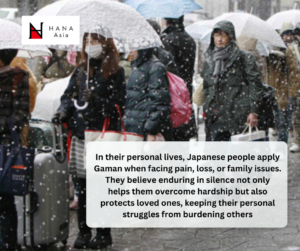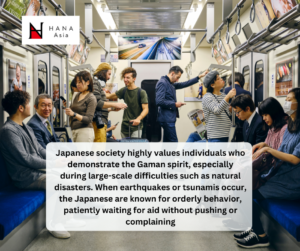
15.11.24
GAMAN Spirit 我慢 of Japanese
The spirit of “Gaman” (我慢) is a profound and unique aspect of Japanese culture, closely tied to how Japanese people approach difficulties and challenges. “Gaman” means patience, endurance, and maintaining composure without complaint, even when faced with tough challenges. This is not only a personal trait but also reflects a life philosophy that Japanese people ... Read more
The spirit of “Gaman” (我慢) is a profound and unique aspect of Japanese culture, closely tied to how Japanese people approach difficulties and challenges. “Gaman” means patience, endurance, and maintaining composure without complaint, even when faced with tough challenges. This is not only a personal trait but also reflects a life philosophy that Japanese people value and apply in many areas of life.
The Gaman spirit has roots in Buddhist and Confucian principles, which value patience and personal restraint. In Japanese society, showing patience and endurance is seen as a way to maintain harmony and stability within the community. Overcoming hardships with calmness, without drawing attention, and without burdening others is seen as a mark of maturity and personal integrity.
In the work environment, Gaman helps Japanese people face job pressures and heavy workloads without complaint. They do not easily give up when faced with challenges but patiently see tasks through. Many Japanese people are willing to work overtime and take on difficulties without complaint, viewing it as a duty to the job, the company, and their colleagues.
In their personal lives, Japanese people apply Gaman when facing pain, loss, or family issues. They believe enduring in silence not only helps them overcome hardship but also protects loved ones, keeping their personal struggles from burdening others. They prefer to confront pain discreetly and independently rather than risk causing worry to those around them.
Japanese society highly values individuals who demonstrate the Gaman spirit, especially during large-scale difficulties such as natural disasters. When earthquakes or tsunamis occur, the Japanese are known for orderly behavior, patiently waiting for aid without pushing or complaining. In emergencies, Gaman shines through in how they calmly face the situation and cooperate, helping maintain order and resilience.
While Gaman builds resilience and strengthens community spirit, it can also lead to psychological strain as Japanese people often refrain from expressing emotions or seeking support. The discipline and patience of Gaman sometimes leave individuals feeling isolated, silently bearing stress and anxiety because they fear that expressing their feelings might lessen the value of their patience.
In modern Japanese society, Gaman still holds its core values but has evolved to better fit today’s lifestyle. Younger generations increasingly understand the importance of balancing endurance with self-care. Many are more open to showing emotions and seeking help when needed, recognizing that Gaman can coexist with modern values that prioritize mental well-being.













